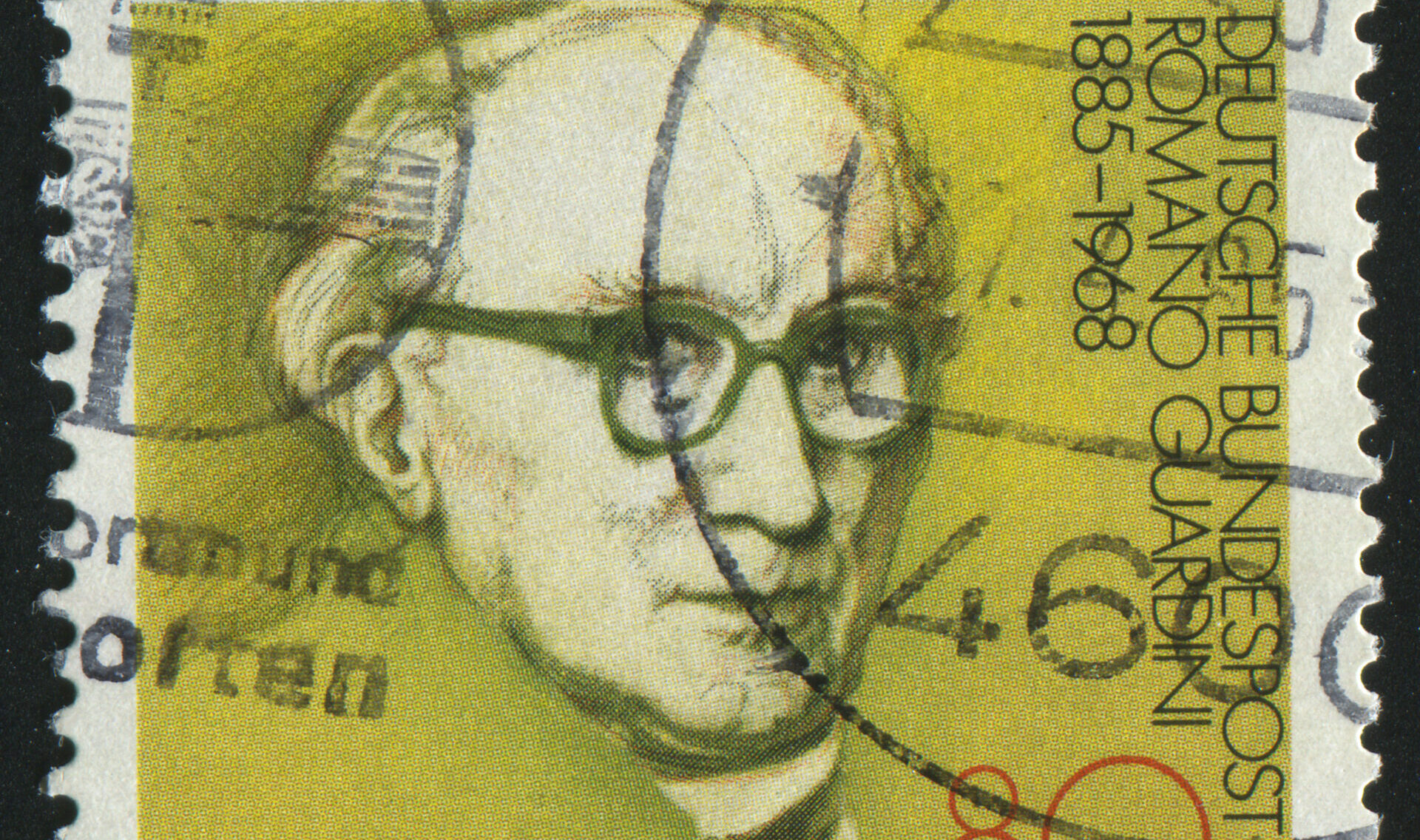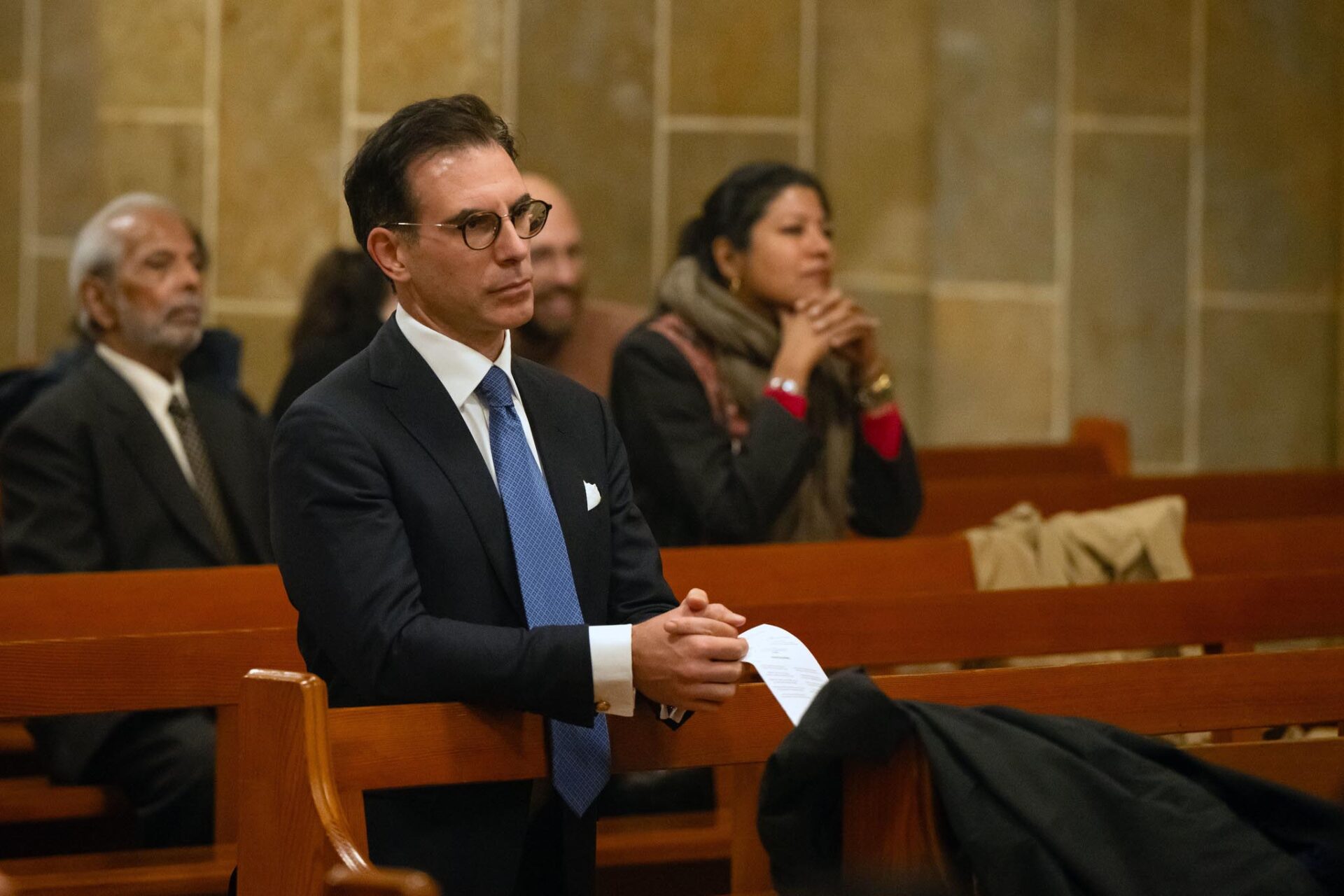
There is much confusion in our thought as to the true meaning and nature of human culture. We speak at times of the culture of our own day [1939], and at times refer rather to the absence of culture in our civilization. Or again, attention is called to the unchristian culture of the bourgeois era, or the new unchristian culture of nationalistic fascism, and a plea is made for the safeguarding of Christian culture in our world, or again for its revival.
Wherever the word culture is used, it refers to something that has to do with human endeavor, and generally effort as spent by man in the adjustment of his environment to his needs or desires. We call a field in which weeds and other plants are allowed to grow in natural wildness and irregular array uncultivated. When human effort is expended to develop better crops by orderly and intelligent cultivation of the field, we speak of agriculture (field-culture). The latter is a human art by which man endeavors through his intelligent industry to realize the best possibilities of plant growing. Culture everywhere refers to ordered human endeavor made for the purpose of producing better results or realizing as fully as can be the possibilities of development latent in things and not realized by the haphazard methods of nature. Culture definitely implies human improvement of nature, but for the purpose of greater realization of the possibilities of nature.
Culture everywhere refers to ordered human endeavor made for the purpose of producing better results or realizing as fully as can be the possibilities of development latent in things and not realized by the haphazard methods of nature.
Culture in reference to man should then mean the application of human endeavor and of reason to the natural abilities of man for the development of the best that is in him. Human culture would have reference first of all to man himself, to his own abilities of understanding and will, of knowledge and creation, and then to his entire environment insofar as this is intimately connected with human life. The whole field of human culture in its widest sense embraces all the activities and abilities of man, all the aspirations and inspirations of his nature, the entire field of human existence. It would include the mental or intellectual realm as well as the material, and the individual as well as the social aspects of life.
Culture vs. Civilization
Not infrequently the terms culture and civilization are used convertibly, yet the two should be kept distinct for the better understanding of each. Insofar as man under all circumstances endeavors to turn his environment to his own uses and improves on the ways of nature in the attempt, the term culture can be applied to the ways of living of all peoples, even those who are definitely classed as uncivilized. There is then of course a wide range of degrees of culture between that of the primitive man whose creative products of mind in general are at a minimum and that of the most highly developed peoples of our day. A people is spoken of as civilized, on the other hand, when its social life is established on moral principles making for peace and common cooperation, these principles being generally accepted and embodied in an official code of law and custom, to which appeal is made for redress whenever violations occur. Whether such a code is put down in writing or handed on by oral tradition is quite secondary.
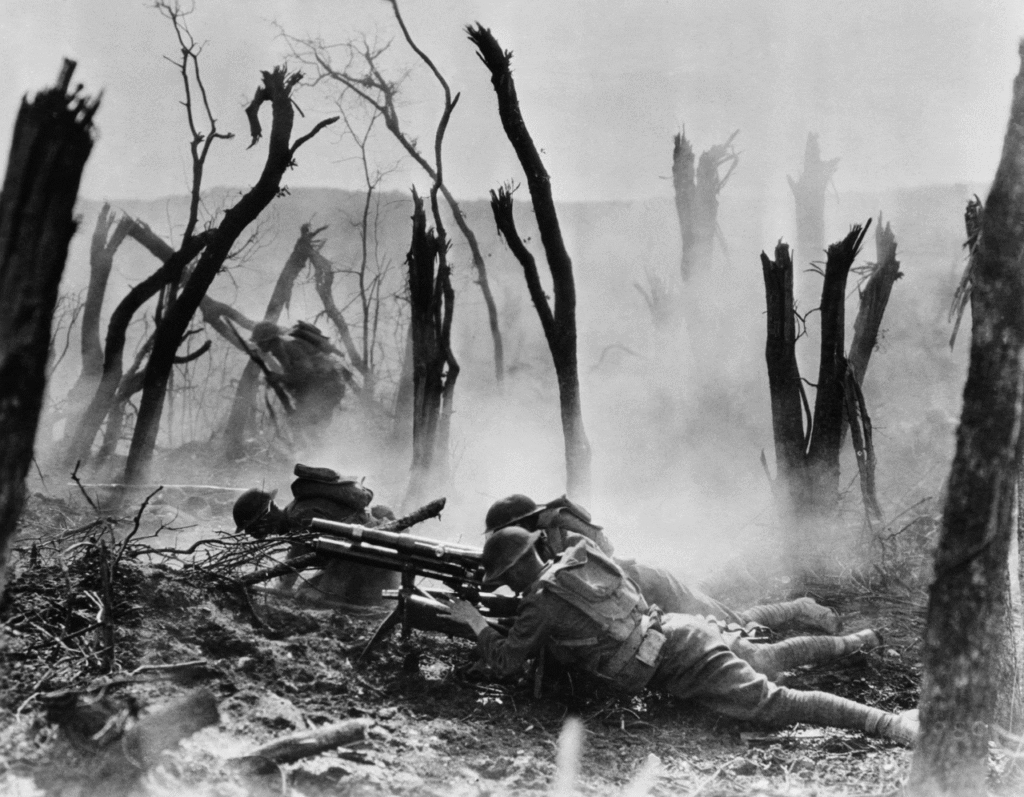
Image Source: AB/Wikipedia British gun crew advancing against German entrenched positions, 1918.
While there is always some interrelation between the culture and the civilization of a people, the coordination is not necessarily a fixed one. It is possible for a well civilized people to remain on a relatively low stage of culture, and likewise for a people in a highly developed stage of culture to remain relatively uncivilized, or perhaps better to relapse back into barbarian ways of life. For the products of cultural advance, especially the material developments, may be used not only for the promotion of social peace and justice, but also for their more successful violation. Our own age has witnessed a frightful world war [1914-1918] in which not only the high achievements of scientific and technical advance were used for the greatest possible slaughter of lives, but in which there was also a general breakdown of commonly accepted ethical laws and traditions. Again the gigantic racketeering of our century, made possible by the rapid methods of transportation and communication, and the like, are an outstanding example of the products of culture put to definitely anti-civilized, barbaric use.
The whole trend of human life under the inspiration of the bourgeois spirit has been in this same direction. This spirit has undoubtedly promoted the immense advances we have been making in material culture. But it has likewise brought about the disintegrating effects upon our civilization which result on the one hand from the ruthless general economic competition of individualism and on the other from the equally ruthless suppression of individuals, and the wholesale legal murders, of totalitarianism, together with its suppression or discouragement of many forms of cultural achievement in the field of human thought….
Reformation: Deformation
The cultural heritage of our day and age is the product of the anti-Christian trend that was given to human affairs in Europe and America through the great apostasy of the Reformation. For a long time, elements of Christian culture persisted and some persist even to our day, yet the dominant cultural attitude has been that of the bourgeois this-worldliness and materialism and naturalism. This distinct cultural trend of what is termed the modern period of human history has been divided into three stages by a vigorous Catholic thinker and student. Jacques Maritain describes these stages as those of a Christian naturalism, which was the classical period of the Renaissance; this was followed by the rational optimism of the bourgeois enlightenment, in which the supernatural as well as the spiritual was rejected and increasingly ejected out of human life; and finally we have the stage of materialistic pessimism, which is the new trend of disillusionment with man and is called the revolutionary period of the post-Victorian era. This third contemporary stage is marked by a reaction against the empty hopes of the previous stage and as well against the Christian culture rejected by its bourgeois predecessor. But whereas the contemporary cultural radical knows well the bourgeois culture, which he rejects for the very reason that he knows it so well, he is really totally ignorant of the traditional Christian culture. His rejection of it is purely an inheritance of the preceding bourgeois stage, and he knows Christian culture and ideals only in the caricatures of it that his progenitors of the enlightenment and their successors had handed down to him. Even most Catholics of our day have no definite conception of their true Christian cultural heritage. They have indeed imbibed the principles of it, but at the same time they have been living for generations in the atmosphere of the prevalent unchristian naturalism and materialism, they have been inhabiting the world wrought by this unchristian thing, and in many ways they have not remained entirely uncontaminated.
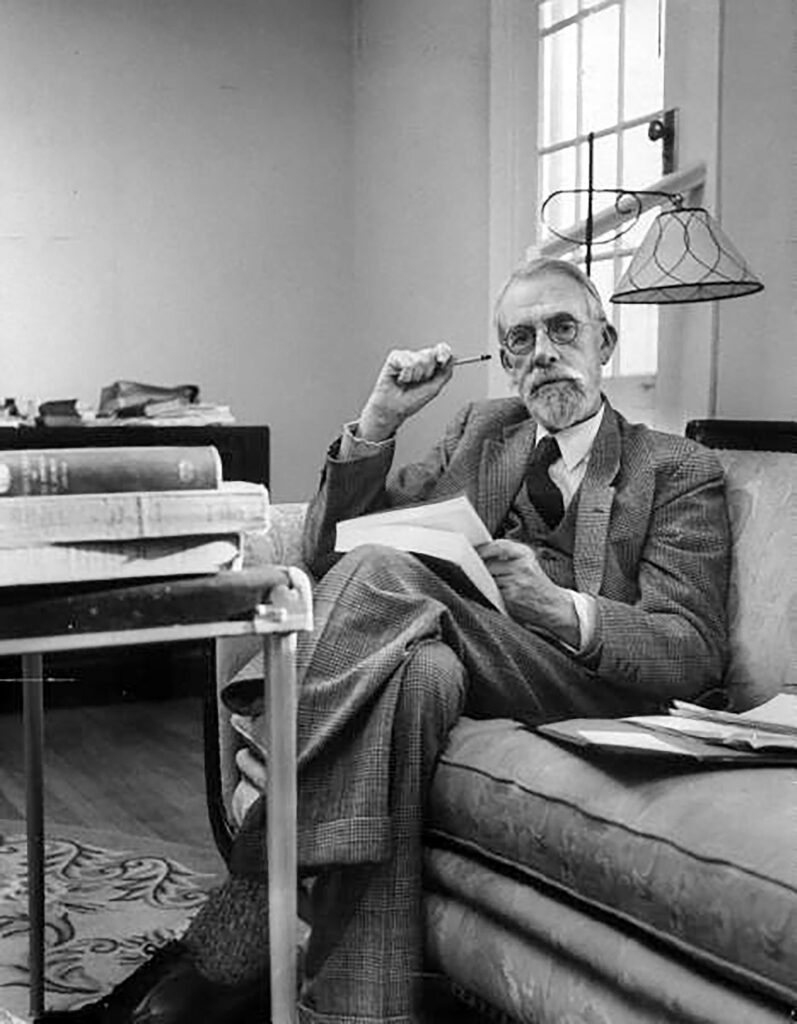
Image Source: AB/Levan Ramishvili on Flickr
It is no wonder then that the culture of our day is characterized as being at the very opposite pole of any genuine Catholic culture. Its general aim is material prosperity through the amassing of material wealth. Only that is good which furthers this aim, all is bad that hinders it, and ethics has no say in the matter. The bold glorification of material progress has been accompanied by a denial of the spiritual, so that all joys and pleasures were sought on the level of the material. The denial of the supernatural was accompanied by the reduction of religion to a man-made myth. The supremacy of the irrational, of impulse, emotion, passion replaced that of reason and all permanent truths, eternal principles were laughed out of existence together with spiritual values of every kind. Hence the social conditions of human life which result from this, the open fostering of injustice rather than equity, of selfishness and oppression, even the exaltation of ignorance, vulgarity and venality. Instead of the Christian virtues of love, fellowship, compassion and sympathy, it has engendered fear, cruelty, hatred.
Most Catholics of our day have no definite conception of their true Christian cultural heritage.
In Christ Renewed
The task of the Christian today is not, however, to turn his back on the entire culture of today. That would but be an admission of cowardice and defeat, and would play entirely into the hands of the anti-Christ whose spirit has been dominant since the public rejection of the Church of Christ. What is needed is to imbue our civilization and culture with a renewed Christian spirit, and thus give to it the vitality it is seeking and save it from the destruction to which it seems to be tending in quick time. “Western civilization today is threatened with the loss of its freedom and its humanity,” writes Christopher Dawson. “It is in danger of substituting dead mechanism for living culture. Hedonism cannot help, nor yet rationalism. It can be saved only by a renewal of life. And this is impossible without love, for love is the source of life, both physically and spiritually.”
It is a new spirit that modern culture needs so sadly, the age-old inspiring and unifying spirit of Christian love, rather than any literal return to any Christian cultures of the past.
It is a new spirit that modern culture needs so sadly, the age-old inspiring and unifying spirit of Christian love, rather than any literal return to any Christian cultures of the past. The Church of Christ is catholic in regard to human culture. There is nothing human that is foreign to her, provided only the human is put into proper alignment with the superhuman. In a sense the Church is supra-cultural in the same way as she is supernatural. She needs the natural as an integral element of her being, but she elevates it and Christianizes it by purging it of what is unchristian and transfusing it with Christian ideals and values. In the same way the Christian spirit needs to be expressed in an entire culture in order to exercise its life properly. Ordinarily the Church can absorb all elements, even the latest developments, of human culture, only that she will also purge these of what is unchristian in them and then assume the positive elements into the supernatural scheme of the Christian life. Being truly Catholic, the Church is opposed to no particular traits of culture such as are peculiar to an individual nation or an individual period of history. She has room for all, and no amount of them can exhaust the expression of the spirit of Christ in her. Being a society of members living here on earth, an intimate fellowship in Christ and not an atomistic assembly of antagonistic or unrelated individuals, she can take up the positive elements of any culture and elevate them by transfusing them with the Spirit of Christ even as she does the elements of nature in general. This process of elevation is always also a process of purging for Christ in accordance with the essential law of Christian life, purgation for elevation, the putting off of the old man and the putting on of Christ, but it is the putting on by way of drawing all creation into the life and love of Christ.
This Catholic culture, if true to its inheritance, would include the sound concepts and traditions of all times, the best developments of human progress of all ages, and that in all the fields of human interest and endeavor, theological, philosophical, historical, social, political, economic, literary, artistic, ethical. It would be truly catholic in its scope and thus realize the ardent desire of Pius X that the true Christian spirit flourish again in every manner and that Christ be formed in all.
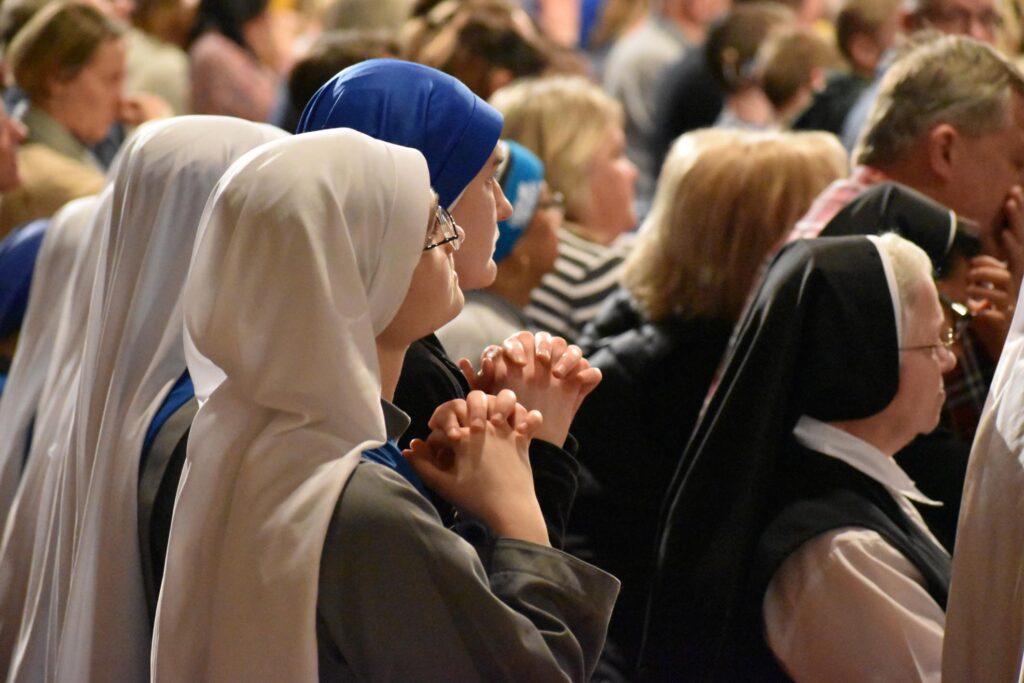
Image Source: AB/Catholic News Agency
Liturgy and Culture
The Christian liturgy is instinct with the love of Christ for man and with the love of man for God and for his fellow-men. The essential act of liturgical worship is also eminently an act of love for God as well as for one’s neighbor, it is the worship of all souls united intimately in the charity of Christ. The Christian cannot enter actively into the liturgical worship of the Church without receiving therefrom the inspiration to extend the expression of his love and service of God and neighbor also into the daily actions of his life, for anything but such an effect of one’s participation in the liturgy would brand that participation as merely external and insincere instead of being the wholehearted communion with God and the members of Christ that it should be. Whatever the Christian does in the liturgy he will feel inspired to transfer also to his daily life. That is why active participation in it could be called the primary and indispensable source of the true Christian spirit, that is, of the spirit of Christ that will bear fruit in every way in the lives of the faithful.
The development of a true culture, i.e., the realizing of the best possibilities in human nature, is essentially a social phenomenon, as we have seen. Now the liturgy presents us with the divinely established model of social intercourse between men under the guidance of Christ. While it safeguards all the values of human personality, it uses the energies of God Himself for sloughing off all the excrescences of individualism, thus elevating all that is good in man above the narrowness of individual selfishness, of snobbery, or of extreme love-blind nationalism, into the catholic sympathy of Christ for all men, for all things human, for all that is good in God’s world. The rich variety found in the various liturgies of the Church and in particular also within the Roman liturgy, the adjustment of liturgical requirements to all the needs of man, the sameness of fundamental principles and eternal verities on which it is based in spite of its richness and variety, when properly understood, will be a strong safeguard against the deadening legalistic attitude or mechanical externality which is the sworn enemy of all true culture as it is of the true Christian spirit.
Whatever the Christian does in the liturgy he will feel inspired to transfer also to his daily life.
Any culture has to do greatly with the material things of creation, and a wholesome Christian culture will depend very much on the proper position of the material in the entire Christian scheme of life. According to the latter, the whole material world was created to be an instrument and as it were an extension of man. Contact with the material should for man always be an expression of his spirit and soul made after the image of God. Proper use of the material in human life needs knowledge of the dispensation of God; its use must be connected up with a proper discipline of mind and will, of morals as rooted in ethics and religion. In all of this the liturgy is again the model as well as the source of true inspiration. Just as a material Weltanschauung necessarily makes material progress an end in itself, so the Christian spirit drawn from the liturgy will necessarily use material things as the means or instruments they are in the design of God. The average living out of this spirit in daily life will thus result in a Christian culture, according to which all material progress will be put into the service of man for the better development of his higher abilities and will enter also through man into the service which the Christian renders to God in his daily life. The primacy of the spiritual will be assured in human life and culture under inspiration of the liturgy, but in conjunction with the full employment and rightful enjoyment of all the material goods God has placed at the disposal of man. Even the recreational activities of man will reflect this same proper alignment and thus again become truly cultural, instead of being the means, as they are in our bourgeois civilization, of the further despiritualization of man and of the exploitation of his passions for the sake of private profit.
The liturgy is the ordinary school of the development of the true Christian.
Since in the resultant Christian culture the material is always the sign and the instrument of spirit, since proper relationship between the material and the spiritual means also proportion and harmony, there should be also a revival of Christian art, to replace the ugliness and mechanical artificiality of so much of our contemporary life. Here as elsewhere it is impossible to serve two masters, and he who is not with Christ is against Him. Christian culture aligns all the elements of life with Christ even as does the liturgy in a concentrated manner. It is safe to say that once the liturgical spirit results in the rebirth of a Christian culture there will also be a great revival of Christian art, in which the beauty of spirit will receive widest expression in all the material artifacts of man, and it will be an art that is not esoteric and hidden to the many, but a means of social enjoyment and of the ennobling of communal life.
Culture of the Whole Man
The liturgy is the ordinary school of the development of the true Christian, and the very qualities and outlook it develops in him are also those that make for the best realization of a genuine Christian culture. The truly cultured man must be cultured also in heart and soul, not only in intellect and manners. His culture must be of the whole man, soul and body, person and environment; it must permeate him entirely and give a proper balance to all the elements that go to make up his being and his life, producing in him harmony between his inner soul and his outer actions, between reason and the emotions, between the individual in him and his social relationships, the natural and the supernatural. In all this, the liturgy is not only his guide but his first school of experience. It is the liturgy which will give him a sense of the divine purposiveness of all his actions, of the sense of sociability with his fellowman, of the symbolical character of his external environment as the expression of his higher ideals. It will help him to recognize what is good in every aspect of life and will inspire him to develop it in every way, to the avoidance only of what is contrary to the true values of body and soul from the standpoint of their divine destiny and dignity.
Christian culture aligns all the elements of life with Christ even as does the liturgy in a concentrated manner.
It gives him the noblest concept of the dignity and privileged responsibility of man as a member of the mystical body, a brother of Christ, an adopted child of God, whose work it is at all times to be about his Father’s business, and to be a positive mediator between the Creator and all His creation. As such, and as a sharer in the general priesthood of Christ and an apostle of the word of God before all the world, he will show forth the truth and beauty of God in all his actions, in all his contacts. Through him the material surroundings will be elevated to the dignity of a fitting environment of the child of God, a higher expression of the beauty and truth of God Himself. In his daily life he will give fullest expression to the spirit of the liturgy which despises no goods of body and of earth, but uses them as gifts come from God for the greater service of God in daily life. From it he will take the inspiration of constant growth in Christ and, never resting satisfied with what has been attained, will strive ever to give greater expression to the being of God as revealed through the beauties of the created world.
Thus the liturgy will be for him as it was for the early Christian a universal school of divine service, therefore also a school of discipline and instruction whose lessons will find expression in a growing Christianization of human culture. As all the elements of life are in the liturgy elevated to the service of God, so he will learn to imitate the liturgy in his daily life, and will learn to see again the divine value of all the elements of human life when set in proper relation to the spiritual and to God. Where the liturgical spirit flourishes in the hearts of men, it will not be satisfied to remain hidden there, but will needs burst forth openly in the world into the most abundant fruits of human endeavor or into a true Christian culture for the glory of God and the greater sanctification of men.
The above article appeared in 1939 in Orate Fratres (13:296-304) and is reprinted with the permission of The Liturgical Press, Collegeville, MN.
Dom Virgil Michel, O.S.B., 1890-1938, was a monk of St. John Abbey in Collegeville, MN, and considered the Father of the American liturgical movement.

